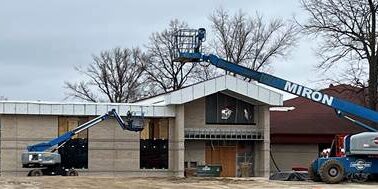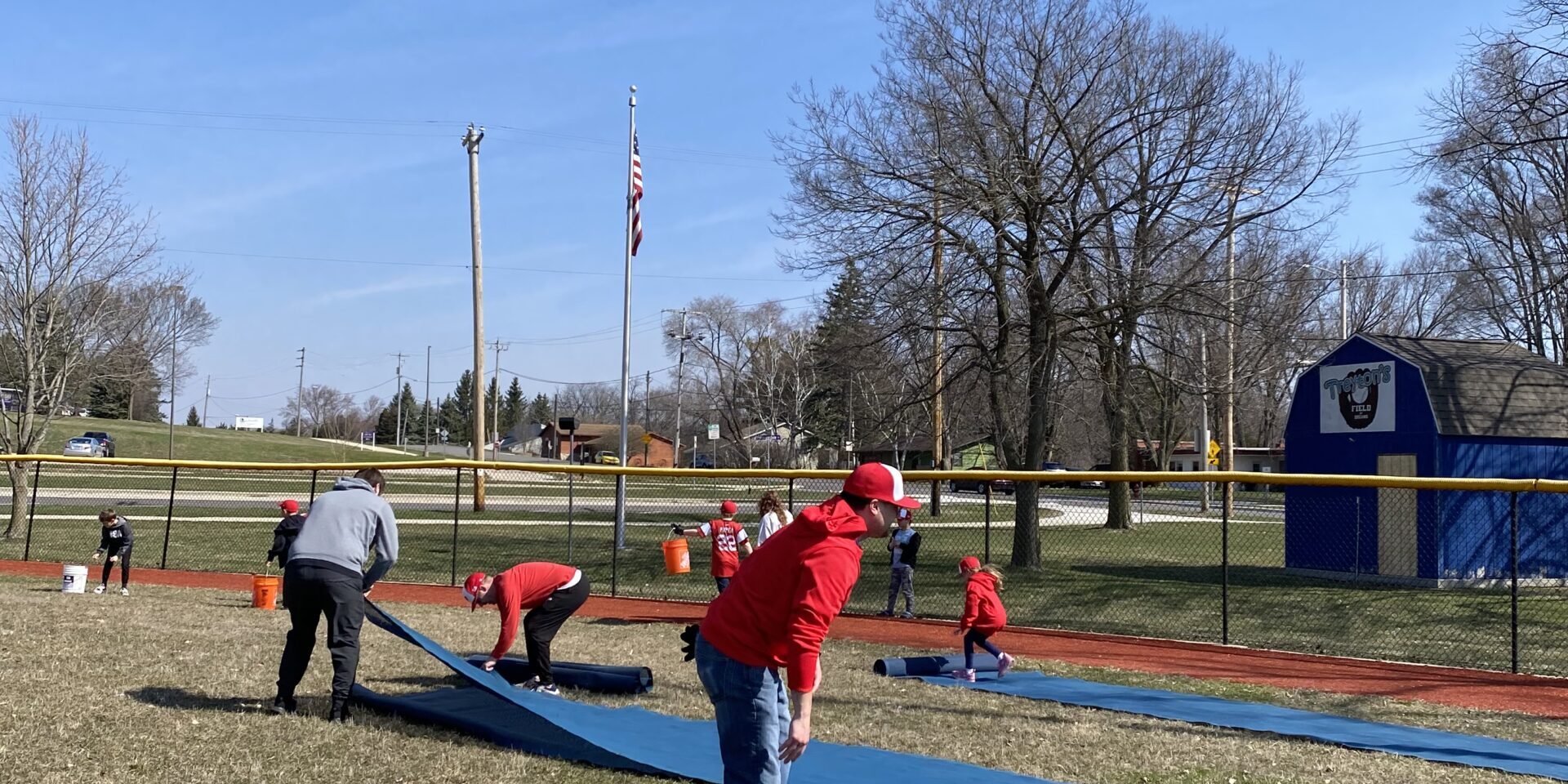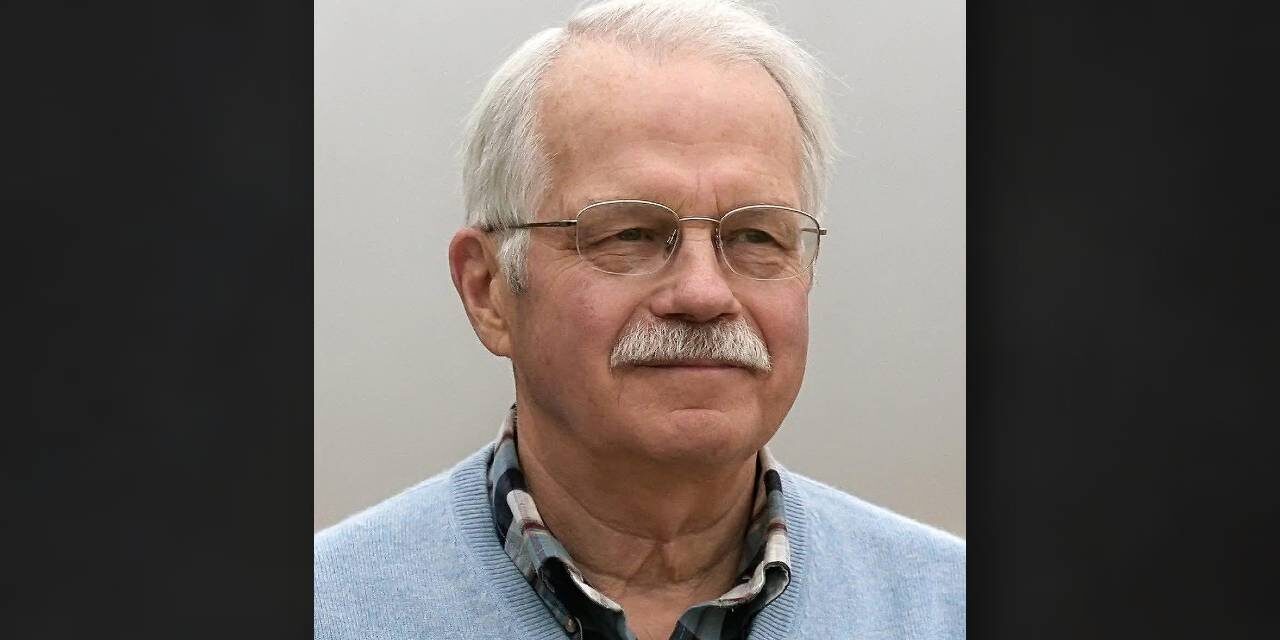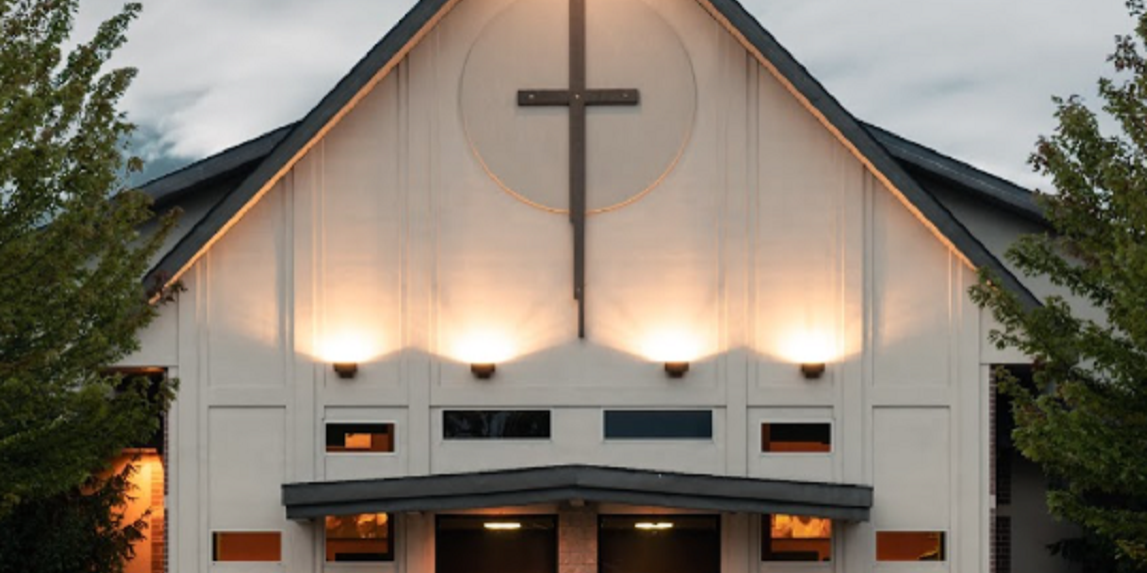By Lynn Binnie
Whitewater Banner volunteer staff
whitewaterbanner@gmail.com
Whitewater Solar, LLC [WS] has applied to the Public Service Commission of Wisconsin [PSC] for the construction of a new “solar farm,” officially described as “a new electric generation facility for 180 megawatts alternating current (MWac) power using photovoltaic (PV) solar panels.” The PSC docket may be found here. WS is a wholly owned subsidiary of D.E. Shaw Renewable Investments [DESRI], a New York City based firm that describes itself as “a leading developer, owner and operator of renewable energy projects in the United States.” Their website states, “Since 2010, DESRI has worked closely with valued communities and trusted partners to create a future powered by renewable energy. We’ve built a diversified portfolio across 24 states with over 10 GW of generation capacity, enough to power nearly 2 million homes.” Based on that statement, it would appear that WS would be expected to generate enough power for approximately 35,000 homes.
The company has signed decades-long leases with a number of property owners for a total of approximately 2567 acres, “of which, the proposed project arrays make up 988 acres, and the alternative project arrays make up 231 acres….The proposed project includes 23 fenced array areas, with 17 proposed array area sites and six alternative array area sites.” Most of the land is currently used for farming. A small parcel would be located within the city of Whitewater, but the rest are in the towns of Cold Spring, Whitewater, and LaGrange. One of the attractions for siting the project in the area is the proximity of the cogeneration plant located on County U, which is now owned by We Energies and a sister corporation. This would make for very efficient transmission of solar generated electricity into the power grid.
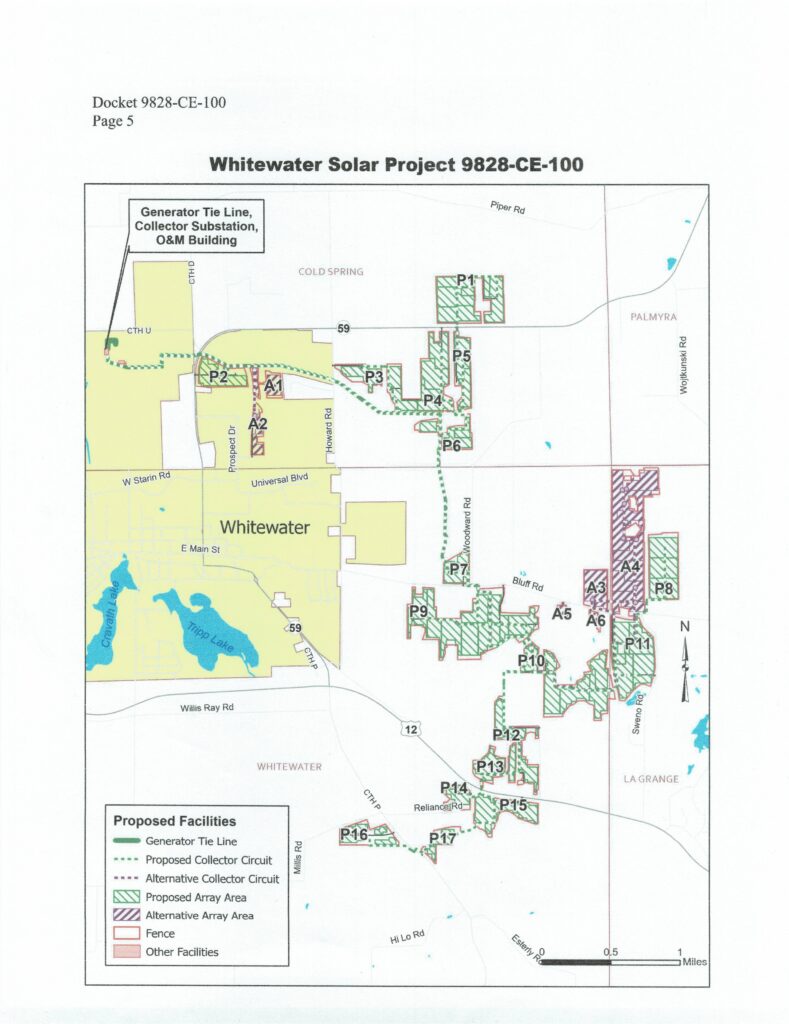
As one of the first steps in the approval process, on November 19 the PSC issued a notice to property owners in the area regarding the environmental assessment that they are conducting. “Commission and Wisconsin Department of Natural Resources (DNR) staff are now analyzing the application and conducting a review of the environmental impacts of the proposed project. As part of this effort, the agencies are requesting comments from the public to help the state agencies determine the potential impacts associated with the project and the scope of the environmental assessment (EA). The agencies encourage persons with local information or environmental concerns to provide comments,” the notice stated. The deadline for submitting such comments is December 23, 2024. Comments on the scope of the EA can be submitted through the PSC website at https://psc.wi.gov where you can click “file a comment” on the lower left-hand side of the page, then locate docket 9828-CE-100. The notice states that “comments for the EA scoping are most effective when they discuss 1) Any potential human and environmental impacts of the proposed solar project; or 2) Any specific actions or changes to the proposed project that might minimize or mitigate the potential impacts of the project.”
At a meeting that Whitewater Solar held at the Whitewater University Innovation Center in August, representatives of Chicago based Ranger Power, which is assisting with development of the proposed project, indicated that they had begun signing leases with property owners in 2017. Those owners were prohibited from disclosing the plans, and it seemed that all of the other property owners in the area knew nothing about the project until they had been contacted by the company shortly before the meeting. It appeared that virtually all of the non-participating property owners in the area were opposed to the project. Some indicated that they favor the growth of sustainable energy generation, but they did not feel that it was a good idea to take “some of the best farmland in the state” out of agricultural production. Drew Vielbig, senior development manager for Ranger Power, stated that in order to attain the state’s goal of electricity generation being 100% carbon-free by 2050, it’s estimated that approximately 5% of the state’s farmland will need to be converted to solar. Ultimately someone asked whether anyone in the meeting was participating in the leases. One brave gentleman raised his hand, indicating that he’s ready to retire and his children have no interest in farming. Although Vielbig declined to give any indication of the lease payments offered to the property owners, it was assumed that many of them might be able to increase their income compared with farming.
Other concerns that were expressed included noise. It was stated that it would be fairly unobtrusive, as it is only the occasional moderate sound of motors repositioning the panels to follow the sun. “How will property values of homeowners who are not participating be affected,” someone inquired. Vielbig stated that a number of studies have shown that there is generally no significant impact on nearby property values. Additional concerns included possible health effects and increased temperatures in the area.
Since the August meeting, many property owners in the area have been active in continuing to express their concerns about and opposition to the project. It is indicated that, per the plan, one of the homeowners with an approximately one acre property would be surrounded on three sides by the fences that will delineate the project, with the other side being the public road. Only a 150′ setback from private property is required. Yvette Loiselle, a resident in the area of the proposed project, has maintained a very active Facebook group named “Stop Whitewater Solar Farm.” Their website may be viewed here.
When asked what the odds were that opposition could derail the project, Vielbig stated that he anticipated that there might be opportunities for public comment in county and town meetings and definitely will be before the Public Service Commission. However, he indicated that the PSC is the only body that has jurisdiction over such projects, and as long as an applicant is able to demonstrate that they have met all legal requirements, the application will be approved. Corey Singletary, director of regulatory affairs for Citizens Utility Board [CUB] of Wisconsin, an organization that represents utility customers, including homeowners, before the PSC, confirmed that perspective to The Whitewater Banner. “State law is very permissive [regarding such applications],” Singletary stated. “Unless an applicant is violating regulations or law,” it’s hard to challenge a proposal. He stated that in the case of wind turbines, there is a Wind Siting Council that provides advice to the PSC regarding adverse impacts of a proposal, other than environmental, to an area. CUB had suggested to PSC that they establish a similar council regarding solar applications, but no action has been taken. Sometimes, he indicated, an applicant may make “good neighbor” payments to an adjacent property owner who is severely impacted or actually offer to buy a property. Singletary confirmed that oftentimes an electric utility will purchase a solar project after it is operational, but if the utility itself was proposing such a project the PSC would be required to conduct a more comprehensive review.
State Senator Mark Spreitzer, who represents the Whitewater area as part of the newly redistricted District 15, attended the August meeting. Afterwards he indicated that he feels that the Legislature needs to consider enacting more criteria that must be considered as part of the approval process for a solar project.
If the project is approved, Whitewater Solar indicates that it hopes to begin construction in April 2026 and for the project to be completed in February 2028.
A different company has tentative plans to construct a solar project on the former city landfill which is located adjacent to the compost site. City Public Works Director Brad Marquardt recently indicated that the company has not completed their planning process but is making payments to the city to keep their options open.
Editor’s note: The yard sign depicted on the homepage has been displayed on a number of properties, most of them being in the towns.








